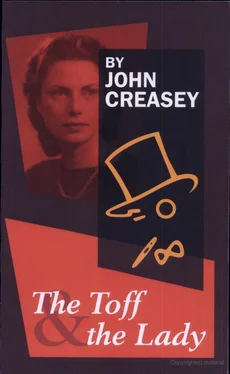John Creasey - The Toff and The Lady
Здесь есть возможность читать онлайн «John Creasey - The Toff and The Lady» весь текст электронной книги совершенно бесплатно (целиком полную версию без сокращений). В некоторых случаях можно слушать аудио, скачать через торрент в формате fb2 и присутствует краткое содержание. Жанр: Старинная литература, на русском языке. Описание произведения, (предисловие) а так же отзывы посетителей доступны на портале библиотеки ЛибКат.
- Название:The Toff and The Lady
- Автор:
- Жанр:
- Год:неизвестен
- ISBN:нет данных
- Рейтинг книги:5 / 5. Голосов: 1
-
Избранное:Добавить в избранное
- Отзывы:
-
Ваша оценка:
- 100
- 1
- 2
- 3
- 4
- 5
The Toff and The Lady: краткое содержание, описание и аннотация
Предлагаем к чтению аннотацию, описание, краткое содержание или предисловие (зависит от того, что написал сам автор книги «The Toff and The Lady»). Если вы не нашли необходимую информацию о книге — напишите в комментариях, мы постараемся отыскать её.
The Toff and The Lady — читать онлайн бесплатно полную книгу (весь текст) целиком
Ниже представлен текст книги, разбитый по страницам. Система сохранения места последней прочитанной страницы, позволяет с удобством читать онлайн бесплатно книгу «The Toff and The Lady», без необходимости каждый раз заново искать на чём Вы остановились. Поставьте закладку, и сможете в любой момент перейти на страницу, на которой закончили чтение.
Интервал:
Закладка:
“Must I tell you again? No!”
“Now look here, Phyl.” began a young man.
“I will not do anything more!” declared Phyllis Armitage, and judging from the tone of her voice she was on the point of losing her temper. “I wish I’d had nothing to do with it at all! I was a fool. Why, I might lose my job and my references, I might even have my certificates cancelled!”
“Oh, nonsense! You couldn’t help being ill.”
“I’m not ill.”
“No one else knows that,” said the man. “Honestly, Phyl. you’ll be doing a lot of people a good turn if you’ll go back and take on night duty.”
“I said no, and I meant no. They’ll realize at once that I was malingering if I get back by eight o’clock. Even if I were to go, I can’t be sure that they would post me to her room. And if I did go back and they did post me to her room and she talked all night, I wouldn’t pass on a word to you.” She sounded almost in tears.
The man spoke again.
His voice had altered, and Rollison frowned as he heard the words, carefully uttered and with just the degree of menace which might be expected to take effect.
“You know, Phyl, now you’ve started, you can’t very well back out.”
“What—what do you mean?”
“Supposing someone was to drop a hint that”
“You— beast! ” cried Phyllis Armitage. There followed a
sharp sound; very much like a slap, and a thud, as if the slap had taken the man by surprise and he had staggered back against the wall. There followed another silence, broken only by the laboured breathing of the girl.
Then: “You’d better be careful.” said the young man who, according to Jolly, had a pleasant countenance. “You’ll fly into a temper once too often. I won’t try to make you see sense any more to-night, but you’ll go on duty to-morrow and you’ll do what I ask you.”
The girl did not answer.
“Or you’ll have cause to regret it,” said the young man, and there was the sound of footsteps.
By then Rollison was at the front door. He went out but did not close it. He stepped up the stairs and reached the next landing before the young man appeared. He caught a glimpse of fair, curly hair and a round, ingenuous face, on which was a look of some surprise. Rollison stepped out of sight. The young man stood on the landing for some time, and then he seemed to make a decision, for the door closed with a snap and he walked quickly down the stairs. By the time Rollison was on the landing again, an engine was starting up in the Court. The boarded windows prevented Rollison from looking out, but he felt sure that Jolly would not lose the man, and he knocked at the door of Flatlet 6a.
There was no immediate answer.
He knocked again. The knocker was a small one of brass, and there was no bell. If the girl were in the inner room, she might not hear, unless the inside door were open. He gave her a minute by his watch, then rapped loudly.
He heard her footsteps in the hall.
When she opened the door, she backed away, startled at the sight of a stranger, although the stranger was smiling. Her face was pale, and she looked as if she had been crying. He thought she had hastily wiped her eyes and put on powder, which was more expertly applied than Gwendoline’s had been.
Phyllis Jane Armitage was better looking than Gwendoline Barrington-Ley. She was fair, and her hair was in loose, probably natural curls, making her head look round. Only a nose which was nearly snub prevented her from being really lovely, but it was somehow the right nose in the right place. The look of surprise on her face was not altogether because of Rollison—she had an air of perpetual surprise.
“Good-evening,” said Rollison.
“Good-evening.”
“May I see Miss Phyllis Armitage?”
“I am Miss Armitage.”
“Then I hope you can spare me a few minutes,” said Rollison, and walked past her into the hall. She looked still more surprised but did not protest. She closed the door, glanced at him curiously, and then led the way to the room where she had talked with the young man. Almost the first thing Rollison saw was a man’s cigarette case, large enough to hold twenty cigarettes, on a small table by the side of an easy chair.
The flatlet was comfortably and pleasantly furnished. There was good taste in the flowered cretonnes at the windows and loose-covers of the same material on the three easy chairs and a pouffe in front of the electric fire. A small gateleg table stood in the middle of the room, a console radio was the most expensive piece of furniture there—it was in a corner, with a vase of antirrhinums and phlox on it.
Rollison handed the girl his card.
He did not think she had ever heard of him, and he felt quite sure that she had not sent him the photograph.
“I don’t quite understand why you have called,” she said.
“I hope I will be able to save you trouble,” said Rollison, and accepted a chair which she touched. As she sat down opposite him she looked apprehensive, and he went on: “I’ve come from the nursing home.”
She was immediately on the defensive. “I have never seen you there.”
“I hadn’t been there until this afternoon,” said Rollison. “Miss Armitage, there was an unfortunate incident after you left. Your patient was taken seriously ill.”
As she sat back aghast, she seemed all eyes. There was green and blue and grey in those eyes, which were glistening
as if it would not take much to make her cry.
“The illness probably won’t prove fatal, but it might. In any case, the police will make close inquiries into what happened while you were in the room with her, and why you left at such short notice.”
“I—I was taken ill.” The words lacked conviction. She had been allowed no time in which to collect herself; had he spoken to her an hour later, she might have managed to sound convincing.
“Were you?”
“Of course! I had permission to leave!”
“You don’t look ill.”
“You are impertinent!” she snapped, but he thought her resistance was likely to collapse at any moment.
“I don’t think impertinent’s the word,” Rollison said, gently. “The police will make sure that they get the truth, you know, and they will think it odd that you show no signs of illness now.”
“Are—are you a policeman?”
“No, I’m responsible only to myself,” said Rollison, “and what I learn I can keep to myself. Why did you pretend to be taken ill?”
He was afraid that she was going to be stubborn even now. If he was to help her, and he was quite sure that she badly needed help, he needed her confidence and trust. So he sat back, smiling at her invitingly, while she fought her battle. He could see the changing thoughts in the expression of her eyes. Abruptly, she said:
“I did it to help a friend.”
“How could it help anyone?” demanded Rollison.
“A friend of mine knew—knew about the patient who has lost her memory.” She was talking quickly, rather like a child anxious to be finished with a recitation which it had been learning with great difficulty. “He said that he thought he knew her but wasn’t sure. He wanted to look at her. He could have done that through the window, of course, but—well, he said that a quick glance wouldn’t be any good. He suggested that I left the room without telling anyone. Then if another nurse entered the room and saw him there it wouldn’t be serious for me, as I was supposed to be ill. I let him persuade me. Once I’d left the room and said that I was unwell. I had to keep up the pretence. Matron sent me home. That is all I can tell you.”
“Except the name of the friend,” said Rollison.
She set her lips tightly and did not answer.
Читать дальшеИнтервал:
Закладка:
Похожие книги на «The Toff and The Lady»
Представляем Вашему вниманию похожие книги на «The Toff and The Lady» списком для выбора. Мы отобрали схожую по названию и смыслу литературу в надежде предоставить читателям больше вариантов отыскать новые, интересные, ещё непрочитанные произведения.
Обсуждение, отзывы о книге «The Toff and The Lady» и просто собственные мнения читателей. Оставьте ваши комментарии, напишите, что Вы думаете о произведении, его смысле или главных героях. Укажите что конкретно понравилось, а что нет, и почему Вы так считаете.












